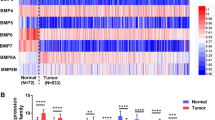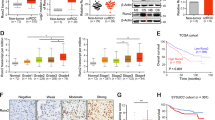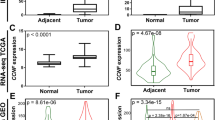Abstract
The aim of this study is to analyse the of expression levels of microRNA-200 family members in patients with metastatic clear cell renal cell carcinoma (ccRCC). Analysis of microRNA expression was performed on 23 paired DNA samples extracted from kidney tumour tissue and the surrounding normal renal parenchyma. MicroRna-200c was found to have significantly lower expression (in kidney tumour tissue compared to normal renal parenchyma. No other microRna-200 family members showed statistically significant differences in expression levels between tumour and normal kidney tissue. Recent data suggest that the role of microRNA-200c in tumour pathogenesis is rather contradictory, and the underlying mechanisms by which microRNA-200c affects the carcinogenic potential of malignant cells remains unclear and requires further investigation at the molecular level.
This is a preview of subscription content, access via your institution
Access options
Subscribe to this journal
Receive 12 print issues and online access
$259.00 per year
only $21.58 per issue
Buy this article
- Purchase on Springer Link
- Instant access to full article PDF
Prices may be subject to local taxes which are calculated during checkout


Similar content being viewed by others
References
Novick A. Kidney cancer: Past, present, and future. Urol. Oncol. 2007;25:188–95.
Chow W, Dong L, Devesa S. Epidemiology and risk factors for kidney cancer. Nat Rev Urol.2010;7:245–57.
Krahmal NV, Zavyalova M, Denisov EV, Vtorushin SV, Perelmuter VM. Tumor epithelial cells invasion: mechanisms and manifestations. Acta Nat. 2015;7:18–31. (in Russian)
Tam W, Weinberg R. The epigenetics of epithelial-mesenchymal plasticity in cancer. Nat Med 2013;19:1438–49.
Chan S, Wang L. Regulation of cancer metastasis by microRNAs. J Biomed Sci. 2015;22:9.
Li L, Li W. Epithelial–mesenchymal transition in human cancer: comprehensive reprogramming of metabolism, epigenetics, and differentiation. Pharmacol Ther. 2015;150:33–46.
Wang X, Chen X, Wang R, Xiao P, Xu Z, Chen L, et al. microRNA-200c modulates the epithelial-to-mesenchymal transition in human renal cell carcinoma metastasis. Oncol Rep. 2013;30:643–50.
Gregory P, Bert A, Paterson E, Barry S, Tsykin A, Farshid G, et al. The miR-200 family and miR-205 regulate epithelial to mesenchymal transition by targeting ZEB1 and SIP1. Nat Cell Biol. 2008;10:593–601.
Bracken C, Gregory P, Khew-Goodall Y, Goodall G. The role of microRNAs in metastasis and epithelial-mesenchymal transition. Cell Mol Life Sci. 2009;66:1682–99.
Zhang J, Ma L. MicroRNA control of epithelial–mesenchymal transition and metastasis. Cancer Metastasis Rev. 2012;31:653–62.
Wang Z, Zhao Y, Smith E, Goodall G, Drew P, Brabletz T, et al. Reversal and prevention of arsenic-induced human bronchial epithelial cell malignant transformation by microRNA-200b. Toxicological Sci 2011;121:110–22.
Jurmeister S, Baumann M, Balwierz A, Keklikoglou I, Ward A, Uhlmann S, et al. MicroRNA-200c represses migration and invasion of breast cancer cells by targeting actin-regulatory proteins FHOD1 and PPM1F. Mol Cell Biol. 2011;32:633–51.
Uhlmann S, Zhang J, Schwäger A, Mannsperger H, Riazalhosseini Y, Burmester S, et al. miR-200bc/429 cluster targets PLCγ1 and differentially regulates proliferation and EGF-driven invasion than miR-200a/141 in breast cancer. Oncogene. 2010;29:4297–306.
Gibbons D, Lin W, Creighton C, Rizvi Z, Gregory P, Goodall G, et al. Contextual extracellular cues promote tumor cell EMT and metastasis by regulating miR-200 family expression. Genes &. Development 2009;23:2140–51.
Lee H, Jun S, Lee Y, Lee H, Lee W, Park C. Expression of miRNAs and ZEB1 and ZEB2 correlates with histopathological grade in papillary urothelial tumors of the urinary bladder. Virchows Arch 2013;464:213–20.
Park S, Gaur A, Lengyel E, Peter M. The miR-200 family determines the epithelial phenotype of cancer cells by targeting the E-cadherin repressors ZEB1 and ZEB2. Genes Dev. 2008;22:894–907.
Wiklund E, Bramsen J, Hulf T, Dyrskjøt L, Ramanathan R, Hansen T, et al. Coordinated epigenetic repression of the miR-200 family and miR-205 in invasive bladder cancer. Int J Cancer. 2011;128:1327–34.
Koo T, Cho B, Kim D, Park J, Choi E, Kim H, et al. MicroRNA-200c increases radiosensitivity of human cancer cells with activated EGFR-associated signaling. Oncotarget. 2017;8:65457–68.
Sun Q, Liu T, Yuan Y, Guo Z, Xie G, Du S, et al. MiR-200c inhibits autophagy and enhances radiosensitivity in breast cancer cells by targeting UBQLN1. Int J Cancer. 2014;136:1003–12.
Lin J, Liu C, Gao F, Mitchel R, Zhao L, Yang Y, et al. miR-200c enhances radiosensitivity of human breast cancer cells. J Cell Biochem. 2013;114:606–15.
Liu W, Huang Y, Liu C, Yang Y, Liu H, Cui J, et al. Inhibition of TBK1 attenuates radiation-induced epithelial–mesenchymal transition of A549 human lung cancer cells via activation of GSK-3β and repression of ZEB1. Lab Investig. 2014;94:362–70.
Huang C, Lin C, Huang Y, Wei L, Ting L, Kuo C, et al. Garcinol downregulates Notch1 signaling via modulating miR-200c and suppresses oncogenic properties of PANC-1 cancer stem-like cells. Biotechnol Appl Biochem. 2017;64:165–73.
Nickoloff B, Osborne B, Miele L. Notch signaling as a therapeutic target in cancer: a new approach to the development of cell fate modifying agents. Oncogene. 2003;22:6598–608.
Wang J, Wakeman T, Lathia J, Hjelmeland A, Wang X, White R, et al. Notch promotes radioresistance of glioma stem cells. Stem Cells. 2010;28:17–28.
Nakada C, Matsuura K, Tsukamoto Y, Tanigawa M, Yoshimoto T, Narimatsu T, et al. Genome-wide microRNA expression profiling in renal cell carcinoma: significant down-regulation of miR-141 and miR-200c. J Pathol. 2008;216:418–27.
Jiang J, Yi B, Ding S, Sun J, Cao W, Liu M. Demethylation drug 5-Aza-2′-deoxycytidine-induced upregulation of miR-200c inhibits the migration, invasion and epithelial-mesenchymal transition of clear cell renal cell carcinoma in vitro. Oncol Lett. 2016;11:3167–72.
Zhang Z, Cao H, Huang D, Wu Q, Chen X, Wan J, et al. MicroRNA-200c plays an oncogenic role in nasopharyngeal carcinoma by targeting PTEN. Tumor Biol 2017;39:101042831770365.
Si L, Tian H, Yue W, Li L, Li S, Gao C, et al. Potential use of microRNA-200c as a prognostic marker in non-small cell lung cancer. Oncol Lett. 2017;14:4325–30.
Acknowledgements
This study was performed using equipment from Biomika Shared Access Center and the unique KODINK research facility, DNA samples from Shared Access Center “Collection of Human Biologic Materials” (Institute of Biochemistry and Genetics UFRS RAS). This work was supported by the Russian Foundation for Basic Research grant (project no. 17-44-020050).
Author information
Authors and Affiliations
Corresponding author
Ethics declarations
Conflict of interest
The authors declare that they have no conflict of interest.
Additional information
Publisher’s note Springer Nature remains neutral with regard to jurisdictional claims in published maps and institutional affiliations.
Supplementary information
Rights and permissions
About this article
Cite this article
Gilyazova, I.R., Klimentova, E.A., Bulygin, K.V. et al. MicroRNA-200 family expression analysis in metastatic clear cell renal cell carcinoma patients. Cancer Gene Ther 27, 768–772 (2020). https://doi.org/10.1038/s41417-019-0149-z
Received:
Revised:
Accepted:
Published:
Issue Date:
DOI: https://doi.org/10.1038/s41417-019-0149-z



